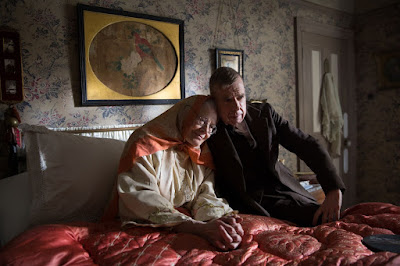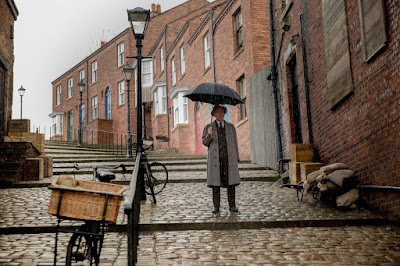Mrs Lowry & Son depicts the relationship between L.S. Lowry, one of Britain’s most iconic artists, and his mother Elizabeth, with whom he lived until her death. Spall plays Lowry, and Redgrave, his over-bearing mother.
"I am a man who paints. Nothing more, nothing less".
For those that are unaware of who L.S. Lowry is, this paraphrased quote from the man is an accurate summary of the film. Mrs Lowry & Son is based on a theatrical play, which is based on a radio drama, and as a consequence finds itself caught in the trappings of its earlier adaptations. For a biopic on one of Britain's most iconic painters, one would expect a deep exploration of his influences and the origins of his art. This is not quite the case.
As the title suggests the focus of the narrative is around the relationship between Lowry and his mother; more specifically, the emotionally abusive relationship between them. The mother is effectively bedridden and awaiting death, with no other tasks but to bemoan her unfulfilled dreams in life, and directs that bitterness and annoyance at her son.
Vanessa Redgrave has the task of bringing the character of Elizabeth Lowry to life, antagonizing and berating with clear and targeted precision. Cruel and scathing, the extent of her control and manipulation is staggering as she consistently pushes her son to follow her "advice", treating any deviation from her plans as a slight against her. It is a performance that gets the blood boiling as you watch this creative individual--who simply loves to paint what he sees and feels--receiving blow after blow to his self-esteem from his own mother. From his choice of subjects in his art to his lack of a female companion, L.S. Lowry (portrayed by Timothy Spall) is attacked from any angle, with the quality of his character constantly being brought into question.
It is his ability to persevere through the waves and barrages of emotional attacks, that actually gives L.S. Lowry credibility. He continues to look after his mother, he continues to pay off his families debts, and through it all, he still manages to see the beauty in the world; a beauty in things that go against traditional ideas of beauty. His mother's antagonistic nature stems from her inability to accept her position in the social classes. Adamant that she is above those that work in the mill, everything that reminds her of that, feeds her anger. Living in the area that she does, her son painting the industrial landscapes only fans the flames further.
Due to the health of Mrs Lowry, the majority of the film takes place within her bedroom. Likely an element that was included in the source materials due to the difficulties in conveying new environments over radio audio, and budgetary restraints when building environments for theatrical plays. Being adapted for film, the opportunity to include additional scenes in visually exciting areas is there to be utilized, and there are certainly some great examples of that being done. The cinematography is great for the internal scenes, with many tight shots of Spall's face, highlighting the toll (or lack thereof) of the incessant emotional abuse. With dialogue-heavy scenes, limited to a single room, there needs to be strength and power in the conveyance of facial expressiveness. Where the film truly feels at home though, is in the limited external scenes.
Those glimpses of L.S. Lowry when he is separated from his mother, are an absolute inversion of character traits. From quiet, obedient, and burdened, suddenly he is jovial, playful, and genuinely content with himself. Observing the sounds and sights of the industrial areas, cinematographer Josep M. Civit makes great use of wide shots in the external scenes, to not only create a contrast with the claustrophobic musty home scenes, but to create a focus on the framing, creating paintings in each brick-laden environment. Emphasising the structures, and the gradients, we see things in the more whimsical manner in which L.S. Lowry does. The whimsical nature is mirrored by Craig Armstrong's musical score. From the opening scenes, it is clear that the composition holds a significant place in the film, and it rises in volume and weight in the external scenes, receding away during internal conflicts.
Mrs Lowry & Son is a definitely a slow-paced drama, that could have greatly benefitted from expanding the film to more visually expressive locations. As it stands though, the relatable nature of the parent/child relationship is the element that hooks the audience in. You can understand where both perspectives are coming from, but you definitely sympathise with one side over the other. It aches to see one being emotionally ravaged by a member of their own family because there are so many pieces of the dialogue that the audience will be more than slightly relatable.
Mrs Lowry & Son is in cinemas from November 28, 2019






